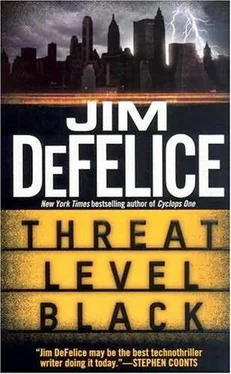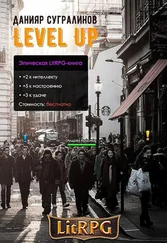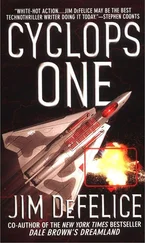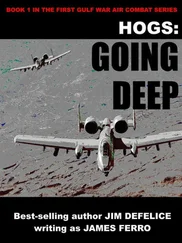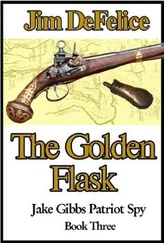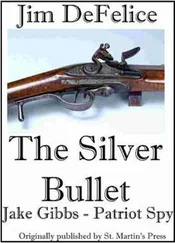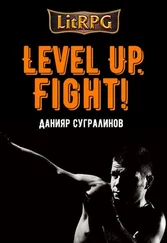There were plenty of choices in northeastern New Jersey. Hit the right one and the power grid would come down. You didn’t have to hit Manhattan at all.
“Iron Hawk, this is Viper One. I need vectors to the target. Iron Hawk? Iron Hawk?”
Howe responded with the course and location, even though he knew the F-16 was too far off. It would take it at least three minutes to close the gap. By then the UAV would be over its target.
The UAV began to rise. That must mean it was getting ready to ignite its bomb.
He had it in his screen now, less than two miles ahead. If he had a cannon, he could easily shoot it down.
He could run the damn thing down, collide with it.
I don’t want to die.
The idea shot into his head, the errant firing of a cramping muscle.
It was just ahead of his left wing now, eight hundred meters, seven hundred. The AMV showed it clearly in the display-the bomb was lashed to the body-but he wasn’t watching the screen; he was looking at it in his windscreen.
He’d have only one chance. Howe eased his grip on the stick, trying to avoid the tendency to overcorrect.
As Howe came up, something about the night reminded him of the dim computer screen he’d fiddled with in the Smithsonian, the simulation of the Hurricanes taking on the V-1s in the air over the Channel.
He could do that now.
Tip the wing right, get the UAV to tumble into the water.
Was he chickening out?
There was no more time to think. Howe pushed the stick, threw his body with it, came back.
A long tunnel opened behind him, the rushing howl of the engine rising two octaves into a shrill hiss. He felt his right arm cramp into a rock.
The Iron Hawk stumbled but held solid, following its pilot’s command.
The wings of the two aircraft smacked against each other. The UAV tumbled, its gull wings spinning. The craft’s tail turned over once, twice, three times. The plane’s internal guidance system started to correct but it was too late: It was far too low to recover from the spin. Gravity had too firm a grip for the craft to shake off; it spun once more, then hit the water about ten yards from shore, disappearing in a volcanic burst of steam.
Iron Hawk rolled awkwardly but recovered, the modifications designed to ensure her survivability in combat proving her salvation now. Howe steadied the craft, eyes on the AMV screen, hardly breathing. He was lost, unsure where he was in the sky-unsure even if he hadn’t blown himself up.
He blinked, and he had it all back.
He was rising over the Hudson River, turning eastward now, New York City a bright mélange of lights. The UAV hit the water below.
He’d saved the damn place, he and the F-16 pilots, and Fisher, and a million other people, doing their jobs and putting their necks on the line.
He’d saved the whole damn place. Manhattan sparkled like a fistful of diamonds, her bright lights blazing in the dark night. New York, New York, brighter than ever.
And then every light in the city flashed out.
Now. It was time. Faud pulled on the goggles and fumbled with the pack, removing the coat.
Was this what God wanted?
To even ask the question was blasphemy.
Faud felt his body tremble as he hoisted the oxygen pack to his back. His hands were so slippery that the pistol fell to the cement, clattering on the floor. As he stooped down to grab at the gun, the blood rushed to his head. Faud felt himself loosing his balance. He tightened his hand around the weapon and straightened slowly.
He must not fail, he told himself.
Fisher waded through the water, reaching a set of concrete steps as the lights snapped off.
Damn it, he thought to himself, I’m always running late in this stinking city.
He stepped up to the top of the stairs. A long stretch of pipes ran to the right, splitting the passage in two. He heard something move ahead.
“Yo. Give it up,” yelled Fisher.
There was no answer.
“You’re not going to make it to the ventilation system. You have to climb all the way up the shaft. I’ll shoot you before you make it halfway up. A couple of times.”
No answer. Fisher sighed and reached to touch the wall with his left hand, walking gingerly along it. The bottom of a service elevator shaft opened about fifty feet ahead.
“You see me, Faud?”
The terrorist answered by firing a gun.
“Dinky little twenty-two, I bet,” said Fisher.
The gun flashed again, this time giving Fisher an idea of where it was. He fired three of his.44’s six bullets, and all smacked hard against a pipe at the far end.
The terrorist shot again. He, too, missed, though Fisher noted that the ricochet was a bit closer.
“All right, let’s get this part out of the way,” yelled the FBI agent. “You have the right to remain silent. Anything you say can and will be used against you in a court of law. You have a right to an attorney-”
A succession of bullets flew through the air. Fisher fired again. When he heard Faud dropping his gear, he realized he’d missed again.
“Hey!” shouted someone from above. Macklin was in the elevator shaft. “Hey!”
More gunfire. More smoke. Fisher tried to remember what the technical people had told him a few weeks earlier about sarin’s ability to spread.
Just as well he couldn’t remember, he thought.
“Stop him!” yelled a voice as the subbasement once more echoed with the roar of gunfire.
Fisher dropped to his knee.
So, where was the terrorist? And did he have friends?
Fisher realized where he was too late to beat him back to the passage. He fired a shot, then yelled to Macklin to grab the canisters.
“Where are they?” shouted Macklin.
“I haven’t a clue,” yelled Fisher. “But they’ll look out of place, even down here, don’t you think?”
Fisher stopped, listening near the opening. Faud was out on the track somewhere.
“Firemen,” said Fisher aloud.
“Firemen?”
“Who would you let into a building in a blackout? A fireman,” said Fisher, answering his own question. “Jeez, what a dummy. I’ve been thinking Con Ed. Look for a fireman’s oxygen tank,” he shouted to Macklin.
“Really?”
“Macklin, if you’re going to ask me questions all day, we’re never going to catch this scumbag,” said Fisher.
He stuck his hand through the opening, then pulled back just as a fusillade of bullets hit the wall. He got down on his stomach and slid beneath the pipes to the entrance Faud had used. But it was still pitch-black and he couldn’t see.
Cursing, Fisher reached back and pulled off his shoe, then slid around so he could throw it in front of the other opening. When Faud started firing, Fisher pulled himself out, fired once, and tumbled down onto the tracks.
Faud stood in the darkness a few feet away. Fisher brought his gun up to fire. As he did, Faud aimed first and pulled the trigger.
Empty.
“Who says today’s not my lucky day?” asked Fisher, rising slowly.
He, too, was out of bullets, though he wasn’t about to share that bit of news.
“You heard your rights, right?” Fisher asked.
The terrorist threw down the gun. Fisher saw him pull something from his pocket-not a weapon, but some sort of canister.
“Let me just guess: sarin gas, right? Going to kill us both?” Fisher took a step. Faud took two backward.
“Except you took the antidote, right? I did,” lied Fisher.
They’d offered him a shot but he hated needles.
“Give it up,” said Fisher. “You’re only going to kill yourself. The antidote might not work.”
“You’ll die too,” growled the man.
“Hey, let’s say you’re right. Where’s the thrill in that?”
Читать дальше
